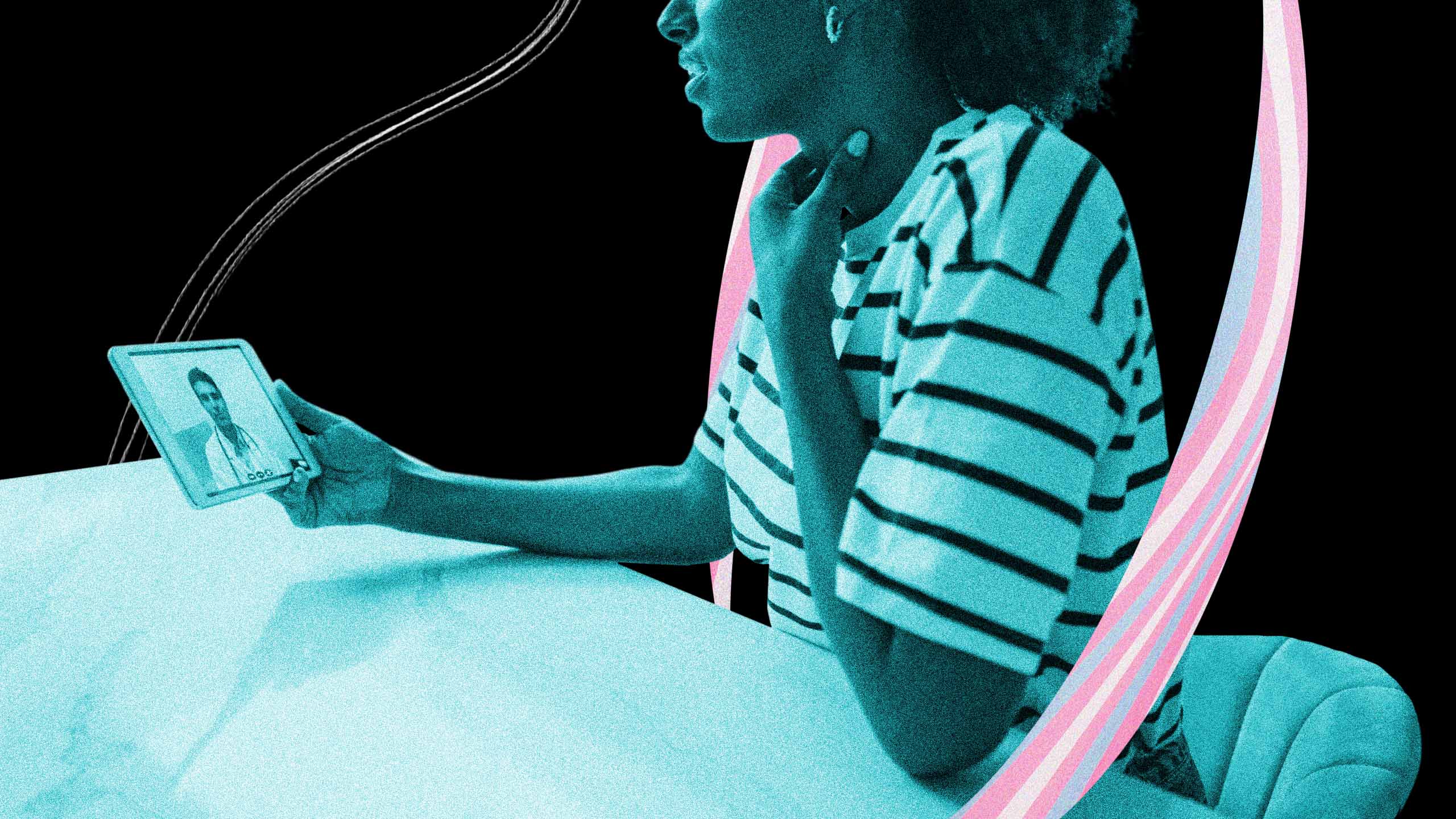Like many people, I relied on virtual healthcare throughout the pandemic. While I am fortunate to only live 40 minutes away from my Toronto-based doctor, being able to see her virtually vastly improved my healthcare access: I am disabled, and the long commute is a huge barrier for me. But in November, I, along with many other Ontarians, was dealt a massive blow when the provincial government decided to cut funding to virtual healthcare and updated its billing codes. Under the new rules, the province cut the fees it paid physicians for virtual care visits. Without being able to collect those fees, many doctors were no longer able to afford to conduct appointments virtually. Several clinics cut their virtual services when the new billing codes came fully into effect this spring.
The move puzzled health advocates. According to the Canadian Medical Association, over 70 percent of physicians believe that virtual care improves patient access and enables quality and efficient care. Federally, Canada invested more than $240 million into developing virtual care between 2020 and 2021. But provinces have varied widely in how they’ve decided to approach virtual care. While Manitoba has similarly scaled back virtual health services, they’ve simultaneously expanded their virtual mental health offerings. Provinces like Alberta and B.C., on the other hand, have accepted virtual care as the future of healthcare—B.C. even has health professionals advocating for virtual hospitals—and Newfoundland is seeking further federal support to improve virtual care as they face ER closures.
Taking away virtual care, conversely, reduces access for many patients. Now, whenever I need to renew my testosterone prescription, I’m forced to commute. On top of the chronic pain I’ve experienced for years, I developed long COVID after multiple infections last year. The last time I attended an appointment, I ended up so fatigued and in so much pain that it took me two and a half days to recover. But it felt like I had no other option.
Ontario’s policy change hasn’t only affected patients with disabilities like me: the new rules were particularly devastating for clinics like Connect-Clinic, a virtual gender-affirming health service that served patients across the province. After the billing codes changed, it was forced to shut down, leaving many of its patients scrambling to find alternatives before their HRT prescriptions needed to be renewed.
For trans people living outside major cities who lost access to gender-affirming care when the billing codes changed, finding alternatives has been particularly difficult.
Léo Martin, age 19, lives in the township of Amaranth outside of Orangeville, Ontario, and had been relying on Connect-Clinic for gender-affirming care for more than a year before the billing code changes came into place. Since the clinic closed, he’s struggled to find a trans-competent doctor either in his hometown or in Ottawa, where he lives during the school year while attending university. His GP doesn’t have the training to take over monitoring his transition and his campus health centre didn’t know where to send him. While he has continued to look for a new clinic to take over his care for the past months, he knows that if he does find one it won’t be near his home in Amaranth—and the wait-list is likely to be long wherever he lands.
Martin’s also apprehensive about approaching new doctors to pursue HRT as he’s noticed increased debate over the validity of gender-affirming care, which he thinks has been spurred on by U.S. news. Martin is unable to afford private care, so if he cannot find a publicly funded physician willing to provide long-term care, he says he’s facing the possibility of having to involuntarily detransition. He’s on the last vial of testosterone from his last prescription and is struggling to access more.
“Some trans folks in rural areas have been forced to pay for private appointments in order to access gender-affirming care.”
“The thought of having to stop and lose the progress and go back to how I was before is genuinely terrifying because I don’t know if mentally I could handle that,” he says. “Transitioning, like for a lot of other trans people, kind of saved my life.”
Without the ability to see publicly funded doctors virtually, some trans folks who live in rural areas have been forced to pay for private appointments in order to access gender-affirming care. Jay (who wishes to go by first name only), a disabled trans person based in Owen Sound, Ontario, says that accessing gender-affirming care has always been difficult for them, since they’ve been unable to find a doctor in their area who is willing to prescribe HRT.
Jay adds that they know people in communities like Thunder Bay and Sioux Lookout who have to travel over 15 hours by car if they can’t afford to fly to Toronto for most of their healthcare. These communities have higher concentrations of Indigenous people, who have been reported to have lower access to healthcare even before the pandemic.
At the beginning of the pandemic, Jay was able to access the virtual service Rocket Doctor for free as an OHIP patient, allowing them to seek medical attention (roughly half of patients from Rocket Doctor are from rural and Northern communities). After the billing codes changed, Rocket Doctor added new fees that they can’t afford: text appointments now set OHIP patients back $55, and $65 for video appointments. Jay was eventually able to find a new doctor, but now travels nearly two hours to attend appointments.
While larger cities have more trans-competent doctors, there’s still no guarantee that trans people living there will be able to access the care they need.
“Everyone I know is looking for a doctor,” says Vernon, a transfemme from Toronto.
Vernon was just beginning her medical transition through Connect-Clinic, and had only had two appointments before virtual consultations were suspended in December. Without the ability to schedule appointments, Vernon says they couldn’t ask questions or get medical advice, which left them feeling anxious during the early days of their transition. Vernon had to rely on her online trans community to answer health-related questions, such as whether she should be concerned about the emotional changes she experienced—like crying several times a day—in the early months of her transition.
“If I didn’t have that community of internet trans girls who banded together to support each other from a distance, then I’d really be rawdogging it,” she says.
Fortunately, Vernon’s doctor from Connect-Clinic eventually transferred their practice to a Toronto community health centre, and Vernon was able to see them again in person a few months later.
This was especially lucky as Vernon, like many trans people, didn’t have a general physician before their former doctor at Connect transferred to the city. Near the beginning of 2020, Trans Pulse Canada reported that 14 percent of trans Ontarians surveyed don’t have a primary physician, while 42 percent had unmet healthcare needs and 12 percent had avoided going to an ER in the year prior.
While Vernon does prefer having the ability to go to a clinic in person when she needs it, she says that having access to virtual care allowed her to avoid the anxiety she feels when dressing feminine and moving around the city.
As trans patients who lost access to their doctors this spring continue to search for alternative care, wait-lists for trans-competent clinics across the province have grown. Max Denley, a trans social worker based in Oshawa who works with queer and trans youth across Ontario, says that it’s been harder to find medical care for his clients, even in suburban and urban areas. He says he doesn’t know how else to help them since some clinics and health centres, like Carea Community Health Centre, have had to close their wait-lists or add geographic restrictions for new patients—and some doctors have stopped advertising that they provide gender-affirming care because they already can’t meet the needs of their current patient load.
“To be telling people, like, I really don’t know where to send you … that’s devastating for them to hear,” he says. “I’m supposed to be the person with the answer.”
The stress of losing access to gender-affirming care is also affecting the mental health of trans Ontarians, says Meagan Jubenville, from the Windsor-based organization Trans Wellness Ontario. Jubenville says her colleagues estimate that they’ve seen a 15 percent increase of new clients since the closing of Connect-Clinic. More trans clients have been coming to them since they provide mental health services to trans people across Ontario and also help them to find and access external services.
Denley adds now that virtual healthcare is no longer accessible, he’s had to change his practice to focus more on finding his clients resources than coping strategies since those strategies can’t fix systemic and physical health issues.
“When people aren’t able to afford private virtual care, they might give up pursuing transitioning.”
Former Connect-Clinic patients who live far outside of Toronto will soon have another option for care: the clinic has partnered with the Alberta-based organization PurposeMed to resume offering their services—but they will no longer be free. In a written statement to Xtra, PurposeMed explained that virtual services will be provided by nurse practitioners experienced in gender-affirming care, and as such, the clinic will still be unable to fully bill for services through OHIP.
“As a result, a virtual gender-affirming care model would require payment from patients to cover the ongoing costs of treatment and ensure the long-term sustainability of services,” they wrote. “We are working to build a financial assistance program to ensure equitable access to this care.”
Jay points out that while paid virtual services do help those who can afford them, they’re not a solution for everyone. “Currently [Telehealth] changes … are going to have the biggest impact on Black and Indigenous and disabled trans folks,” they say.
When people aren’t able to afford private virtual care, they might give up pursuing transitioning, they might put off seeking medical attention until it lands them in the ER—or they may pursue less safe alternatives.
Some trans people may feel desperate enough to take matters into their own hands if they can’t access it through the medical system, warns Cody, another former Connect-Clinic patient. While her future transition hung in limbo following the closing of the clinic, she looked to trans history for another option—DIY hormones.
Without access to care, trans people won’t stop existing, Cody says.
“The simple fact is we’re not going anywhere. This is just making it less safe.”


 Why you can trust Xtra
Why you can trust Xtra


